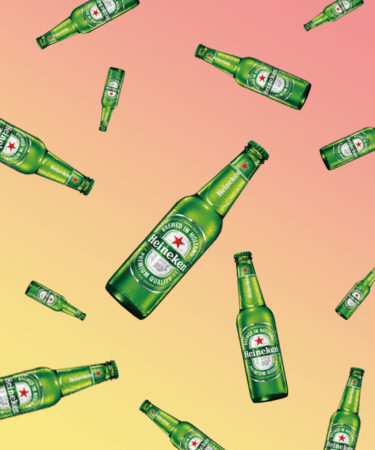Heineken has been brewed for more than 150 years, and it shows: The Netherlands-based brand now produces a portfolio of more than 300 beers and ciders around the globe.
Today, Heineken is the world’s second-largest brewer.
Here are 10 more things you should know about Heineken.
-
Heineken is not German.
Heineken was founded in 1864 by Gerard Adriaan Heineken, who purchased and renamed Amsterdam’s De Hooiberg brewery, in operation since 1592. It moved production from Amsterdam to Zoeterwoude, in South Holland, in 1975. As such, Heineken is Dutch — and its subsidiaries are Mexican, Jamaican, Haitian, Italian, English, Irish, Belgian, American, and, as of recently, Ecuadorian.
-
It brews lagers, ales, and cider.
Heineken’s short list of proprietary products include Heineken, Heineken Light, and Heineken 0.0. However, its list of subsidiaries is long, and spans the globe. The company produces Mexico’s Tecate, Dos Equis, Sol, Bohemia, Carta Blanca, and Indio; Jamacia’s Red Stripe; Haiti’s Prestige; Southeast Asia’s Tiger Beer; and Italy’s Birra Moretti. In May 2019, it acquired a majority stake in Biela y Bebidas del Ecuador S.A. Bielesa, producer of Biela Ecuador.
It also produces the U.K.’s Newcastle Brown Ale; Ireland’s Murphy’s Stout; Belgium’s Affligem Blonde; and Amsterdam’s Amstel Light. In addition, Heineken produces non- and low-alcohol beer brands Buckler and Sagres. It also acquired a handful of craft breweries in recent years, including Lagunitas in the U.S., Beavertown and Brixton Brewery in the U.K.; Belize Brewing Co.; and Oedipus Brewery in Amsterdam, purchased in June 2019.
Heineken also owns the world’s top hard cider producer, Strongbow.
-
It makes tequila-flavored beer.
In 2012, Heineken acquired Desperados, a tequila-flavored beer that targets EDM-loving drinkers. Although its production method yields trace amounts of tequila, the brand is technically classified as a malt beverage. It’s available in a variety of flavors, including Original, Lime, Ginger, and “Nocturno.”
-
Heineken is truly global.
Heineken created its first export label in 1864, expanded production to other continents in 1914, entered Asian markets in 1929, and began targeting international audiences in its marketing and advertising in 1928. It made its first international acquisition, of Austria-based Brau-Beteiligungs A.G., in 2003. Its beer is now available in nearly 200 countries.
-
If green bottles are wrong, Heineken doesn’t want to be right.
Although skeptics will quickly point out Heineken’s green glass bottle is bad for beer — anything less than clear puts beer at risk of oxidation, which can lead to that “skunked” flavor many Heineken purchasers have tasted — the iconic green bottle has been in use since 1884 and doesn’t seem to be going anywhere.
-
Heineken USA’s CEO is a boss.
In June 2018, Heineken USA announced the appointment of Maggie Timoney as president and CEO, effective Sept. 1, 2018. Previously, Timoney served as CEO of Heineken Ireland, and had been with the brand family since starting at Heineken USA in 1998. Her appointment made beer history, too: Timoney is the first woman to be appointed CEO of a major U.S. beer company.
-
Heineken is part of American history.
Heineken USA was founded in 1946, but it first earned a place in American beer history in 1933. That year, it became the first beer import to re-enter the U.S. market after Prohibition.
-
Heineken looks good and does good.
From sportswear to streetwear, Heineken partners with retail brands to create limited-edition, co-branded products. In 2018, for its nine-year-running #Heineken100 campaign, the beer brand partnered with Italian sportswear brand Kappa’s U.S. division for a six-piece capsule collection that included a tracksuit and jersey set. In 2017, it partnered with A Bathing Ape
The company is about more than just good looks, though. Through its soccer initiatives, Heineken has activated more than 2,000 recycling and safe driving initiatives at stadiums nationwide. And its “Brewing a Better World” campaign, launched in 2010, actively pursues partner initiatives to keep sustainability top of mind, including partnerships with +Pool, The Recycling Partnership, Uber, Lyft, Hispanic Federation, and Vital Voices.
-
Heineken is soccer’s BFF.
Heineken has been a sponsor of the UEFA Champions League since 1994, and became the official beer of Major League Soccer (MLS) in 2014. In June 2019, Heineken announced a five-year renewal of its partnership agreement with MLS. It’s easy to see why: The brand has sold 1 million pints of beer at MLS games since 2014, according to a press release.
-
It’s banking on zero.
In 2019, Heineken launched a non-alcoholic label, Heineken 0.0. Its U.S. launch campaign, titled “Now You Can,” includes advertisements targeting health-conscious consumers. One ad in the NYC subway reads, “Beer after hot yoga? #NowYouCan.” We’d argue you could anyway — not to mention the ad misses out on an easy pun (it features a Heineken bottle, rather than a can) — but we like our beer with ABV, anyway.
FAQs
Is Heineken gluten-free?
No, Heineken is not gluten-free. Heineken has gluten as a byproduct of the grains used to brew it. Per the brand’s site, Heineken is brewed with barley leaves which results in lower gluten content than that of wheat-based beers.
